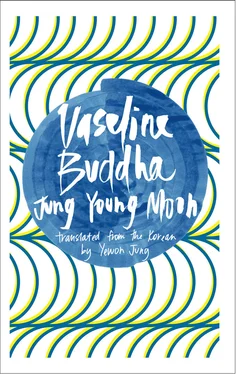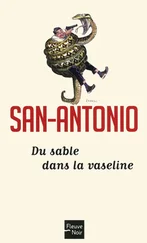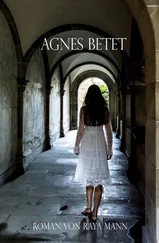Jung Young Moon - Vaseline Buddha
Здесь есть возможность читать онлайн «Jung Young Moon - Vaseline Buddha» весь текст электронной книги совершенно бесплатно (целиком полную версию без сокращений). В некоторых случаях можно слушать аудио, скачать через торрент в формате fb2 и присутствует краткое содержание. Год выпуска: 2016, Издательство: Deep Vellum Publishing, Жанр: Современная проза, на английском языке. Описание произведения, (предисловие) а так же отзывы посетителей доступны на портале библиотеки ЛибКат.
- Название:Vaseline Buddha
- Автор:
- Издательство:Deep Vellum Publishing
- Жанр:
- Год:2016
- ISBN:нет данных
- Рейтинг книги:3 / 5. Голосов: 1
-
Избранное:Добавить в избранное
- Отзывы:
-
Ваша оценка:
- 60
- 1
- 2
- 3
- 4
- 5
Vaseline Buddha: краткое содержание, описание и аннотация
Предлагаем к чтению аннотацию, описание, краткое содержание или предисловие (зависит от того, что написал сам автор книги «Vaseline Buddha»). Если вы не нашли необходимую информацию о книге — напишите в комментариях, мы постараемся отыскать её.
." — Pak Mingyu
A tragicomic odyssey told through free association scrubs the depths of the human psyche to achieve a higher level of consciousness equal to Zen meditation. The story opens when our sleepless narrator thwarts a would-be thief outside his moonlit window, then delves into his subconscious imagination to explore a variety of geographical and mental locations — real, unreal, surreal — to explore the very nature of reality.
Jung Young Moon
Vaseline Buddha — читать онлайн бесплатно полную книгу (весь текст) целиком
Ниже представлен текст книги, разбитый по страницам. Система сохранения места последней прочитанной страницы, позволяет с удобством читать онлайн бесплатно книгу «Vaseline Buddha», без необходимости каждый раз заново искать на чём Вы остановились. Поставьте закладку, и сможете в любой момент перейти на страницу, на которой закончили чтение.
Интервал:
Закладка:
What you could call my first romantic relationship in college began while I was on my way home one night, taking a somewhat long way around to my house from the bus stop and going toward an alley. A girl was walking ahead of me, and we walked for a while, keeping a fixed distance between us, but sensing that someone was following her, she — I wasn’t following her but felt as if I were, and the moment that I felt that she, too, could feel that way, I felt more certain of it — she quickened her pace and began to run in the end, sensing danger, and ran through the last alley into her house, and as I stood hesitantly in front of her gate, the gate suddenly flew open and a dog came running out. It wasn’t a very large dog, but it came running out so fiercely that I stepped back and had to run in the end, but the dog, faster than I was, easily caught up to me and nipped at my trouser leg, making it impossible for me to go any further. Thus began our relationship, and we ended up seeing each other for some time because of that encounter, and she later told me that she’d felt, as I had, that someone was following her, and came out through the gate with her dog to give that someone a little scare, but the dog, which saw me at that moment, became agitated, and she let go of the leash — she said that she may have let go of the leash without really thinking about it, that she may have just wanted to do so — and that was why the dog came after me. For a long time after that, I would talk about the humiliation the dog inflicted upon me, and for a long time, she would talk about how ridiculous I looked in my humiliation. But I never told her about how once, when we went to a café together, and a dog there came running and went under the table we were sitting at and stayed there with its head stuck between my legs, I stayed still and let it smell the smell it wanted to smell.
Recalling that episode from long ago, I felt, despite the rejection, the kind of delight you feel when something ridiculous happens to you, so I didn’t go back right away. Curiously, I wanted to further explore the town of the French girl who had made something absurd happen to me. The small town was a typical small French town, and it took less than ten minutes to walk from one end of the town to the other on its main road. I went around every nook and cranny of the town as if everything piqued my curiosity, even though there was nothing to see there.
That night, after roaming around the small town, I stayed at a little hotel there, and while reading Molloy, one of Beckett’s Trilogy, which I bought and was reading at her recommendation, I thought about the Irish author who died not long after he said, while spending his last hours in a hotel in Paris, that he would die if somebody didn’t change the horrible wallpaper.
I also thought about something I read in another author’s autobiography, something his aunt said before she passed away, her last words being, “That’s interesting. Now I understand. Everything is water.” She, who was a doctor herself, went to a dinner party where she met Chekhov, a young doctor who later became an author, and she offended him somehow while having a conversation with him on medicine, and made him express his anger toward her in a letter he later wrote.
That night, in a hotel in a small town in France, I thought for a long time about how you could spend your dying moments. Since dying moments could be important to anyone, or could be considered important, I could think about them for a very long time, and then maybe get a small live octopus and spend my dying moments with it, thinking that the only thing left for me to spend my dying moments with was an octopus, and feeling a certain gratitude toward it for that, and time it well and die at the same time with the octopus, which can’t live long out of water, or die thinking that I’m following the octopus which died before I did. Or I could go buy an octopus a little earlier, and spend my remaining hours, the rest of my life, with it, and die with the realization that there’s no difference whatsoever between the death of the octopus and my own. And I could realize anew, or not anew at all, the fact that death is what eliminates the difference between every living thing, which isn’t anything new, and that everything becomes one before death and extinction, as I share my fate with the octopus. And looking at the octopus, I could mutter, That really strange looking green cat looks like a pineapple somehow, and think, But even as a pineapple, it looks somewhat strange.
And looking at the octopus, and continuing to think about the octopus, and recalling the black pebbles I think I saw once, glistening with water on a pebbled beach, under a blazing summer sun, and the octopus wriggling among the pebbles, I could think about how the octopus wriggled, how many black pebbles there were on the beach, and how black they glistened, and how, looking at them, I felt a certain joy at the fact that they would glisten with water for a long time to come, perhaps even after mankind disappeared, and how absorbed in the joy I was, and wonder which beach it was where I thought I saw the countless pebbles glistening with water, or if the wet pebbles glistened incredibly under the bright moonlight because it was night, not midday, or if it was pitch dark night and I saw the pebbles glisten momentarily because of the light from a lighthouse, or if I heard, between the sound of foam constantly breaking, the comforting sound that pebbles make as they roll around, crashing somewhat uncomfortably into each other, the sound that makes you feel that your heart is being carelessly caressed, but not uncomfortably, and above all, if I had ever been to such a beach, and think that what I was trying to recall was not an octopus wriggling among pebbles, but black pebbles, glistening with water and reflecting some sort of a light, or the countless beams of light reflected by them, and wonder why I had recalled, of the many things I’d experienced or thought of in my life, black pebbles glistening with water, while at the same time breathing my last breath, feeling pleased that I had recalled them.
And in the hotel room where I was staying, there was a flowerpot with daffodils in it, and it didn’t seem like a bad idea to leave my will to the daffodils. So I said in the direction of the daffodils, as if leaving some kind of a will, The treadmill left behind by a squirrel that left on a search for a new path must meet more than three unfortunate ends, regardless of who takes it; in any case, the daffodils that were either in full blossom or were budding, had a shape that seemed fit to talk to.
And it occurred to me that in the act of talking to daffodils there was an element of an aside in a play, which is uttered with the assumption that someone is listening, different from a monologue, which is uttered when no one is listening, even though the daffodils couldn’t talk back, and I may have felt this way because I felt that the flowers, at least, listened to every word of what someone said.
In any case, daffodils were certainly better than shoes to talk to, feeling as if you were talking to each other, and if there was something else that was decent to talk to, it would be something like a fedora. I thought that I could blurt something out to daffodils before I died, and that the act would bring some kind of a pleasure.
I also thought about writers who, like Oscar Wilde, couldn’t stand their own countries, and tried to abandon them, such as Beckett and Thomas Bernhard, and I thought about the country in which I was born and raised and still living, and thought that the biggest thing I tried to accomplish in the country was to leave it permanently, even though there wasn’t really another place I wanted to settle in.
I fell asleep thinking such thoughts, and when I woke up the next morning I was able to think almost nothing at all about the girl I never ended up meeting. But while having breakfast at the restaurant on the third floor of the hotel, resenting the girl, who could have rejected me for a reason she couldn’t tell me, or explain herself — this because the waitress who brought me my food, who was around the same age as the girl, made me think of her — I saw, through a window whose curtains were drawn, two workmen who were replacing the round red roof tiles on the roof of a house across a little alley that was about the same in height as where I was sitting, and I was pleased beyond words. They worked very slowly, and I ate very slowly as if to keep some kind of a pace with them. And I was able to eat slowly because I was lost in thought, about an anecdote which I wasn’t sure was true or not, about Salvador Dali, who supposedly painted the droopy clock in the painting “The Persistence of Memory” not long after watching, as if in a trance, the camembert cheese that was melting on a dinner table. On the table before me was, in fact, a plate holding two pieces of cheese, which I placed deliberately where the sun was shining to make them melt slowly, and as I watched them melting and changing in shape, not as if I were in a trance but as if I couldn’t take my eyes off them, and tried to think of something other than what Dali must have been thinking of as he watched the camembert cheese melt, or in other words, what he must have been thinking of as he tried to see the camembert cheese before his eyes as something else, or, in other words, tried to see it as something that couldn’t be thought of as something else, and again, in other words, of something other than a droopy clock, but nothing else came to my mind other than a droopy clock.
Читать дальшеИнтервал:
Закладка:
Похожие книги на «Vaseline Buddha»
Представляем Вашему вниманию похожие книги на «Vaseline Buddha» списком для выбора. Мы отобрали схожую по названию и смыслу литературу в надежде предоставить читателям больше вариантов отыскать новые, интересные, ещё непрочитанные произведения.
Обсуждение, отзывы о книге «Vaseline Buddha» и просто собственные мнения читателей. Оставьте ваши комментарии, напишите, что Вы думаете о произведении, его смысле или главных героях. Укажите что конкретно понравилось, а что нет, и почему Вы так считаете.












